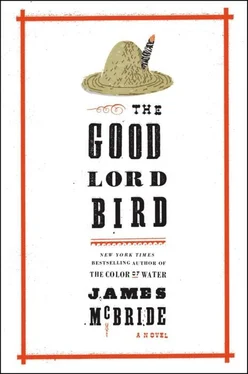“Right, General.”
But he did compromise the time. He blowed that one, too. And for that reason, the one person he could count on, the greatest slave emancipator in American history, the best fighter he could’a got, the one person who knowed more ’bout escaping the white man’s troubling waters than any man alive, never showed up. The last he seen of her was the back of her head as she walked down the road in Chatham, Canada. At the time, I weren’t sad to see her go, neither.
By the time the Old Man got back to Iowa, he was so excited, it was a pity. He left the U.S.A. for Canada with twelve men, expecting to pick up hundreds. He come back to the U.S.A. with thirteen, on account of O. P. Anderson, who joined us on the spot, as well as a few white stragglers who come along for a while and dropped off like usual when they seen that freeing the slaves was liable to get your head squared by an ax or butchered some other way. The rest of the coloreds we’d met up in Canada went back to their homes in various parts of America but had promised to come when called. Whether they was gonna be true to their word or not, the Old Man didn’t seem worried, for by the time he got back to Iowa, he was downright joyful. He’d got the General behind him, that was Mrs. Tubman.
He almost weren’t sensible in his excitement. He was joyful. It ain’t a clean proposition when you decides to mount thirteen fellers and declare a war on something rather than somebody. It occurred to me then he might be slippin’ and I ought to maybe take my leave when we got back home before he got too deep into whatever foolishness he planned next, for he didn’t seem right. But in them days I didn’t linger on any subject so long as I was shoving eggs, fried okra, and boiled partridge down my throat. Besides, the Old Man had more bad luck than any man I ever knowed, and that can’t help but to make a person likable and interesting to be around. He spent long hours in his tent, praying, studying maps, compasses, and scribbling numbers. He always wrote letters like a madman, but now he wrote triple the letters he wrote before, so much that his army’s main job in them first weeks in Tabor involved nothing more than sending and getting his mail. He sent his men to Pee Dee, Springdale, and Johnston City, to pick up letters from safe houses and taverns and friends and send off letters to Boston, Philadelphia, and New York. It took him hours to go through his mail, and while he done that, his men trained with wood swords and pistols. Some of that mail was letters with money from his abolitionist supporters back east. He had a group of six white fellers in New England who gived him big lumps of money. Even his friend Mr. Douglass sent him a shilling or three. But the truth of it is, most of them letters, the ones that weren’t from creditors, contained not money but questions. Them white folks back east was asking for—no begging for—his plans.
“Look at this, Onion,” he railed, holding up a letter. “All they do is ask questions. Talk, talk, talk, that’s all they do. Armchair soldiers. Setting around while someone destroys their house and home with the infernal institution. And they call me insane! Whyn’t they just send the money? I’m the one they trusted to take on the fight, why tie my hands behind my back by asking me how. There ain’t no ‘how,’ Onion. One must do , like Cromwell. There are spies everywhere. I’d be a fool to tell ’em my top-secret plans!” He was confounded with it. He was furious when some of his supporters declared they weren’t going to send him a dime more if he didn’t tell them their plans.
The ironical thing is, I reckon he would have told them his plans. He wanted to tell ’em his plans. Problem is, I don’t think the Old Man knowed what his plan was hisself.
He knowed what he wanted to do. But as to the exactness of it—and I knowed many has studied it and declared this and that and the other on the subject—Old John Brown didn’t know exactly what he was gonna do from sunup to sundown on the slavery question. He knowed what he weren’t gonna do. He weren’t going to go down quiet. He weren’t going to have a sit-down committee meeting with the Pro Slavers and nag and commingle and jingle with ’em over punch and lemonade and go bobbing for apples with ’em. He was going down raising hell. But what kind of hell, he was waiting on the Lord to tell him what that is, is my reckonings, and the Lord weren’t tellin’, at least that first part of the year in Tabor. So we set ’bout Tabor in a rented cabin, the men training with swords and fussin’ over spiritual matters and fetching his mail and grousing amongst themselves, waiting for him to bark out what was next. I got the ague and was on my back for a month of that time, and not long after I got well, the ague hit the Old Man. It floored him. Knocked him on his back. He didn’t move for a week. Then two. Then a month. March. April. At times I thought he was gone. He’d lay there, mumbling and murmuring, saying, “Napoleon used the mountains of the Iberians! I ain’t done yet!” and “Josephus, catch me if you can!” only to fall out again. Sometimes he’d sit straight up, feverish, staring at the ceiling, and holler, “Frederick. Charles! Amelia. Get that bird!” then drop off again, like he was dead. The two of his sons, Jason and John Jr., who declared they was out of the slave war and had already quit, he’d call out their names sometimes, hollering, “John! Get Jason in here!” when neither was within five hundred miles. Several of his army left, promising to return, and did not. But others replaced them. The main ones though—Kagi, Stevens, Cook, Hinton, O. P. Anderson—they stayed, training themselves with wood swords. “We promised to fight with the Old Man till death,” Kagi said, “even if it’s his.”
Four months in that cabin gived me plenty of time to hear the Old Man’s thoughts, for he was in a fever and prone to blab ’bout himself. Come to find out he’d failed at just ’bout everything. He had several businesses that failed: cattle rustling, tannery, land speculating. All gone belly up. Bills and lawsuits from his old business partners followed him everywhere. To the end of his life, the Old Man wrote letters to creditors and throwed a dollar here or there to whomever he owed money to, which was a considerable amount of people. Between his first wife, Dianthe, who he outlived, and his second wife, Mary, who he did not, he had twenty-two children. Three of them, all little ones, died in a bunch in Ritchfield, Ohio, where he worked in a tannery; one of ’em, Amelia, was scalded to death in an accident. Losing them children hurt his heart sorely, but Frederick’s dying, he always seed that as murder, and it was always the biggest hurt on his heart.
We caught Frederick’s murderer, Rev. Martin, by the way. Cold got the drop on him back outside Osawatomie, Kansas, six months earlier, in fall, while rolling through there out of the western territory. We come upon him sleeping in a hammock at his settlement, a small spread tucked in a valley beneath a long, sloping ridge just outside Osawatomie. The Old Man was leading his crew along the edge of that ridge with his eye out for the federals when he suddenly stopped and held up the column, peering down at a figure in his front yard laying in a hammock, dead asleep. It was Rev. Martin, all right.
The Old Man sat atop his stolen mount and stared at Rev. Martin a long time.
Owen and Kagi rode up next to him.
“That’s the Rev,” Owen said.
“It is,” the Old Man said.
Kagi said calmly, “Let’s ride down there and have a talk with him.”
The Old Man stared down the ridge a long time. Then he shook his head. “No, Lieutenant. Let’s ride on. We’ve a war to fight. I don’t ride for revenge. ‘Revenge,’ says the Lord, ‘is Mine’s.’ I ride against the infernal institution.” And he upped and nicked his horse on the side, and we rode on.
Читать дальше












